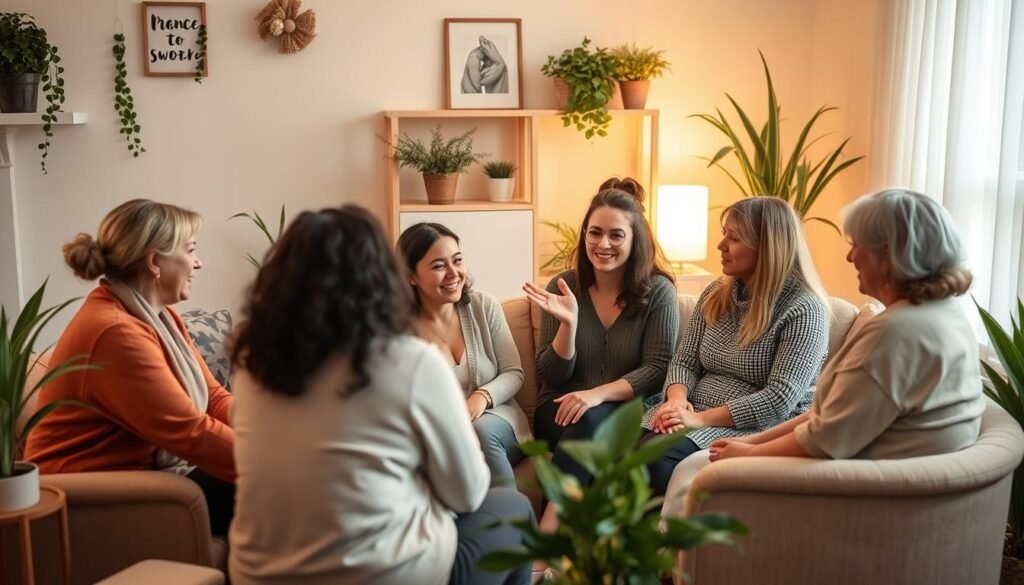Women with Polycystic Ovary Syndrome (PCOS) often face higher risks for mental health issues. They are almost 50% more likely to suffer from psychiatric disorders. This highlights the critical role of PCOS support groups. These groups are vital for sharing experiences, offering emotional support, and teaching coping strategies.
PCOS-focused support groups tackle many emotional challenges. These include the fear of infertility, body image concerns, and social stigma. Joining peer-led programs can notably improve one’s health-related quality of life. It can also lessen symptoms of depression. This underlines the importance of emotional well-being in women’s health.
For further details on the effects of support groups on psychological health, check here.
Key Takeaways
- PCOS increases the risk of psychological disorders, impacting emotional health.
- Support groups provide vital emotional support to women with PCOS.
- Peer-led programs can improve health-related quality of life.
- Addressing issues like infertility and body image in a supportive environment is essential.
- Engagement in support groups can reduce depressive symptoms and promote coping strategies.
Understanding Polycystic Ovary Syndrome (PCOS)
Polycystic Ovary Syndrome, often shortened to PCOS, is a leading endocrine disorder in women. It includes symptoms like irregular periods, high androgen levels, and polycystic ovaries. The condition is complex, covering both metabolic and psychological aspects.
Getting to know PCOS is crucial for managing it well. The criteria for diagnosing PCOS have improved over time. Key systems for diagnosis include the NIH, Rotterdam, and the Androgen Excess and PCOS Society criteria. These criteria allow for the identification of symptoms such as insulin resistance. This can lead to physical issues and increase the risk of diabetes, high blood pressure, and heart disease.
Diagnosing PCOS can be tough and emotionally draining for women. They often feel out of place or confused due to insufficient information. It’s key to remember that PCOS can make anxiety and depression three to eight times more likely.
Women have reported various PCOS symptoms such as hirsutism, irregular or heavy periods, gaining weight, infertility, acne, fatigue, mood changes, and skin issues. The affected age range is broad, from 17 to 51, covering many ethnic groups. Delays in diagnosis are not uncommon, sometimes due to healthcare provider oversight or reluctance to seek help.
Worries about infertility add to the stress for many. With PCOS affecting about 1 in 10 individuals with menstrual cycles, many go undiagnosed. Better awareness and understanding of PCOS are vital for mental health and life quality improvement.
| Key PCOS Symptoms | Associated Risks |
|---|---|
| Irregular Menstrual Cycles | Increased risk of infertility |
| Excess Androgen Levels (Hirsutism) | Potential for depression and anxiety |
| Weight Gain | Higher risk of type 2 diabetes |
| Acne | Psychological distress |
| Skin Discoloration | Lower self-esteem |
Emotional Impact of PCOS on Women
Polycystic ovary syndrome (PCOS) deeply impacts women’s feelings. It leads to mental health issues because of PCOS. Around 8-13% of women in their childbearing years face PCOS. They deal with deep emotional distress due to symptoms.
About 64.1% of women with PCOS have depression. Their emotional struggles come from body image and what society expects. Nearly 70% suffer from excessive hair growth, adding to feelings of inadequacy and worry.
Stress is a big problem for them. It comes from infertility and health problems, raising the risk of depression and anxiety. Social stereotypes about PCOS make them feel alone and lost.
Treatments for mental health in PCOS are here. Cognitive Behavioral Therapy (CBT) helps with depression and anxiety. Eating more protein and less carbs also improves mood.
| Emotional Challenges | Potential Effects |
|---|---|
| Depression | Increased emotional distress, reduced quality of life |
| Anxiety | Heightened stress levels, social withdrawal |
| Body Image Issues | Negative self-esteem, feelings of inadequacy |
| Infertility Concerns | Psychological distress, risk of mood disorders |
| Social Stigmatization | Isolation, increased stress in personal relationships |
We need to treat PCOS with medical and emotional support. Understanding their feelings helps us care more for women with PCOS.
Importance of Emotional Support for Women with PCOS
The importance of emotional support for women with PCOS is huge. Around the world, 2.2% to 26.7% of women may have PCOS. This condition can lead to emotional and psychological stress. Many deal with depression and anxiety, with 37% of women with PCOS having symptoms of depression. This compared to 14.2% in healthy women. And, 42% have anxiety, much higher than the 8.5% in healthier women.
PCOS significantly affects mental health, making women more prone to depression and anxiety. They’re up to six times more likely to have anxiety and four times more likely to be depressed. These facts show how vital mental health support groups are. They offer a place for women to connect, share their stories, and feel understood. Such communities help in healing and understanding.
Joining peer-led support groups is a good step for managing PCOS emotions. These groups teach active coping strategies, like looking at things positively and reaching out for support. This is crucial since not dealing properly with stress can harm mental health. Getting emotional support greatly helps in handling the challenges of PCOS. It acts as a vital support during tough times.
Being part of support networks helps women with PCOS be more resilient. This is especially important considering social stigmas about body image and infertility. Making emotional connections has been shown to boost mental health. It helps women deal better with their PCOS journey. For more details on how emotional support helps, check out this study.
How Support Groups Help Women with PCOS Cope Emotionally
Support groups are key for women with Polycystic Ovary Syndrome (PCOS). They offer a strong sense of community. This helps women connect with others facing similar problems. These bonds reduce the loneliness that often comes with PCOS.
Building a Supportive Community
Support groups create a space for healing. Women can openly talk about their journeys. They make connections that ease PCOS’s challenges. This leads to friendships that boost mental health. It also helps women become more resilient.
Regular meetings strengthen these bonds. They help members create lasting friendships. This is vital for emotional support.
Peer-to-Peer Sharing of Experiences
In these groups, sharing experiences is very helpful. Women learn new ways to cope by hearing others’ stories. This understanding offers relief from anxiety and depression.
It highlights the power of support and shared struggles. By sharing, women find better ways to face PCOS’s emotional challenges. This helps improve their mental well-being. For more insights on supporting someone with PCOS, click here.

Common Mental Health Challenges Faced by Women with PCOS
Women with PCOS often face several mental health issues. It’s crucial to tackle these for better well-being. Mental health challenges are more common in those with PCOS, affecting everyday life significantly.
Depression and Anxiety in PCOS Patients
About half of women with PCOS deal with depression and anxiety. The average age when PCOS is found is around 24 years. This time is key for emotional development. Emotional issues may lead to feeling isolated and having a lower quality of life.
Many struggle with hormone imbalances, making anxiety worse and deepening depression.
Body Image Issues and Self-Esteem
Body image concerns are big for women with PCOS. This affects how they see themselves and their femininity. Many are unhappy with their bodies, feeling inadequate. This hurts their self-esteem.
Common symptoms like obesity and unwanted hair growth also play a role. These issues can harm how women view their bodies. It can cause long-lasting emotional pain and harm mental health.
Coping Strategies Promoted in Support Groups
Support groups for women with PCOS offer a space to share coping strategies and get emotional support. These groups help members find emotional coping methods essential for handling PCOS challenges. Group members share different approaches that help in day-to-day life.
Sharing Personal Coping Mechanisms
Sharing personal coping strategies is a key benefit of support groups. Women talk about how they handle symptoms like anxiety and depression. This sharing creates a space where experiences and solutions are exchanged.
Common coping strategies for PCOS in these groups may include:
- Practicing yoga or meditation to enhance mental clarity and reduce anxiety.
- Engaging in regular physical activity to improve overall well-being.
- Maintaining a balanced diet to address hormonal imbalances.
- Journaling thoughts and feelings to aid emotional processing.
- Fostering supportive friendships to minimize feelings of isolation.
Regular Check-Ins and Emotional Guidance
Meetings offer regular check-ins and emotional guidance. These check-ins allow members to share updates on their progress and PCOS management challenges. This support network combats loneliness and builds resilience.
The discussions often cover:
| Focus Area | Description |
|---|---|
| Stress Management Techniques | Members share tips on managing stress through various healthy practices. |
| Emotional Expression | A safe space for discussing feelings, fostering emotional release and relief. |
| Goal Setting | Encouragement in establishing and achieving personal wellness goals. |
| Resource Sharing | Exchange of useful resources like articles and contacts for professional help. |
This atmosphere helps women with PCOS learn from each other and improve their mental health. Learning effective emotional coping techniques helps reduce negative feelings.
The Role of Healthcare Professionals in Support Groups
Healthcare workers are key in PCOS support groups, improving learning for all who join. They make sure talks are based on solid facts and the best methods. Therapists play a crucial role, helping people deal with PCOS feelings.
Groups led by health pros provide a safe space for sharing about Polycystic Ovary Syndrome. Counseling addresses challenges like anxiety and issues with body image. Over half of the women with PCOS feel it harms their life quality. Getting emotional and social support is key in fighting these problems.
Health experts lead talks on coping well and suggest useful resources. They assist in shedding light on both physical and emotional symptoms. Support groups offer rich value, online or face-to-face, by exchanging experiences. This helps women learn from each other.
The teamwork of health workers in PCOS groups helps create a supportive and educational environment. This makes women feel seen and helped, improving their health and happiness. For extra info on how support groups aid, check out peer support benefits.
Empowerment through the PCOS Community
The PCOS community is key in helping women feel empowered. It offers a place where shared stories and knowledge help everyone grow. PCOS community support lets women know they are not facing their struggles alone. This unity helps fight against wrong ideas in society. It lets members stand up for themselves and get the resources they need.

This network helps women deal with PCOS by learning from each other. They talk openly which helps understand PCOS’s effects better. Everyone shares tips on dealing with symptoms and finding good doctors.
Being strong together means learning about health rights. It means sharing stories to motivate each other. It’s about asking for better care and support together.
- Collective education about health rights and options.
- Sharing personal successes and challenges to inspire resilience.
- Encouraging advocacy for better treatments and support systems.
The power of the PCOS community is about more than just facing struggles. It’s about making the group stronger. This support boosts self-respect, helps shape identity, and lets women stand firm in society. The positive impact reaches families and communities too.
Joining the PCOS community brings a feeling of belonging. Women unite to face PCOS challenges together. They make sure their voices, rights, and stories are recognized.
Lifestyle Management Tips Shared in Support Groups
Support groups are very important in learning how to manage PCOS. People talk about how eating right and staying active can help. They share stories on how changing what you eat and working out can make a big difference.
Nutrition Advice for Managing PCOS Symptoms
In these groups, people give tips on what to eat to handle PCOS better. They suggest:
- Eating whole foods like fruits, veggies, lean meats, and good fats.
- Staying away from processed sugars and carbs to fight insulin resistance.
- Eating smaller meals more often to keep blood sugar steady.
These tips aim to tackle weight gain and insulin issues seen in PCOS.
Exercise and Wellness Recommendations
Discussions on exercise in these groups cover many activities suited to different fitness levels. They recommend:
- Doing aerobic exercises like walking, running, or biking for heart health.
- Strength training to help with muscle and metabolism.
- Trying yoga or Pilates to deal with stress and feel better emotionally.
Being active regularly is key to better health, managing weight, and boosting mood. It’s vital for PCOS lifestyle management.
Online vs. In-Person Support Group Differences
Understanding how online and in-person support groups differ is key for women dealing with polycystic ovary syndrome (PCOS). Online groups offer the chance to connect from anywhere, making it easy for those far away. This means women who can’t easily find local groups can still get support.
In-person support, however, builds a strong sense of community. Being together allows for closer bonds and deeper connections. While some prefer talking face-to-face, others find online groups less scary and just as rewarding.
Choosing between online and in-person support often comes down to what each person wants. What matters most is how you want to interact, your ease with technology, and your support needs. Both types have their benefits, with online groups being more convenient and in-person meetings offering a warm, sharing space.

Women with PCOS should think about these differences in support formats to pick the best option for them. Each kind can give meaningful support, aiding women on their PCOS journey.
Conclusion
Support groups play a key role in helping women with PCOS. Nearly 64.42% of these women feel anxious. This shows how deeply PCOS affects their emotions. Being part of a support group can make them feel less alone. It also helps them handle stress better.
By talking and listening, they learn new ways to cope. They also realize their feelings are normal. Sharing experiences and advice boosts their confidence. It’s important to stay active to fight off depression. This is easier when they have support.
Support groups are a big deal for women with PCOS. They bring hope and make life better. These groups help women feel connected and strong. Together, they find ways to live well despite PCOS.